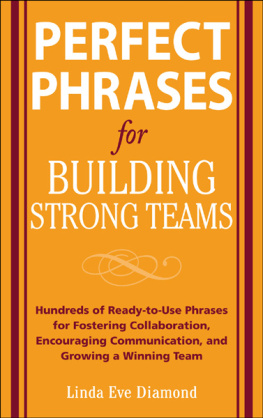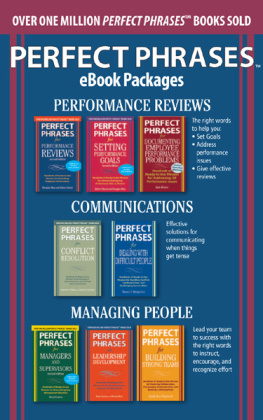
Copyright 2012 by The McGraw-Hill Companies, Inc., Meryl Runion, and Linda Eve Diamond. All rights reserved. Manufactured in the United States of America. Except as permitted under the United States Copyright Act of 1976, no part of this publication may be reproduced or distributed in any form or by any means, or stored in a database or retrieval system, without the prior written permission of the publisher.
ISBN: 978-0-07-179627-9
MHID: 0-07-179627-4
Perfect Phrases for Managers and Supervisors, Second Edition 2010 by The McGraw-Hill Companies, Inc.
PRINT BOOK
ISBN: 978-0-07-174231-3
MHID: 0-07-174231-X
E-BOOK
ISBN: 978-0-07-174410-2
MHID: 0-07-174410-X
Perfect Phrases for Leadership Development 2011 by Meryl Runion
PRINT BOOK
ISBN: 978-0-07-175094-3
MHID: 0-07-175094-0
E-BOOK
ISBN: 978-0-07-175957-1
MHID: 0-07-175957-3
Perfect Phrases for Building Strong Teams 2007 by Linda Eve Diamond
PRINT BOOK
ISBN: 978-0-07-149073-3
MHID: 0-07-149073-6
E-BOOK
ISBN: 978-0-07-159488-2
MHID: 0-07-159488-4
Trademarks: McGraw-Hill, the McGraw-Hill Publishing logo, Perfect Phrases, and related trade dress are trademarks or registered trademarks of The McGraw-Hill Companies and/or its affiliates in the United States and other countries and may not be used without written permission. All other trademarks are the property of their respective owners. The McGraw-Hill Companies is not associated with any product or vendor mentioned in this book.
McGraw-Hill books are available at special quantity discounts to use as premiums and sales promotions, or for use in corporate training programs. To contact a representative, please e-mail us at bulksales@mcgraw-hill.com.
Contents

Contents
Acknowledgments
I was thrilled to have the opportunity to rework this book and update the style of communication and the phrases to reflect current trends and demographic influence. So for that, I thank McGraw-Hill and my editor, Brian Foster.
Additional thanks to Evan Hodkins, who is a wordsmith after my own heart, and to Sharon Campbell, who contributed important content. And my husband, Bob, who contributes levity with an incredible sense of playfulness.
Introduction
There are so many management books on the market today that one might wonder why the world needs one more. The answer is that this book offers something the others dont. Its short and easy to navigate, and it addresses the specific challenges managers have shared with me during my years of management training.
The Challenges of an Accidental Manager
Raise your hand if you manage or supervise one or more people, I asked my seminar attendees. A roomful of hands went up.
Now keep your hand up if youve had management training. Not a single hand stayed up.
In a room of fifty managers, Im lucky to have one who has received training in his or her vocation. Most make their jobs up as they go along. A Harris poll reported that up to 85 percent of managers are untrained. The informal surveys I conduct at my management seminars suggest this is a conservative figure.
Many people became managers the way I did. My first job was to assist on a major research project. Three months into the project, my manager quit. His manager called me in and said, Meryl, Im putting you in charge. I was too foolish and too flattered to decline. I almost drowned in my own incompetence.
Like me, most managers are left on their own to figure out how to manage without training or guidance. They learn through trial and error, with no understanding of procedure and proven techniques.
Trained managers face other challenges. Many find their management training focused on theory, systems, and processes more than practical interpersonal dynamics. Plus, the workplace is changingand changing fast. Women, Generation Y, social media, and globalization are transforming the way we relate, influence, and succeed. There is a new dynamic of communication. Thats why Im revising this book only five years after its original publication. The phrases I recommended five years ago are not the phrases I recommend today.
Why Pick Perfect Phrases? The Importance of Planning Your Words
When managers dont have the words they need to say in a situation, they usually say nothing. I receive frequent letters from managers who tolerate inappropriate behavior from their employees. They ask me for the words to speak in situations they should have addressed years ago. When they find the words, they become willing to take action.
Other managers use aggressive words that create resistance, shut down communication, and backfire. Employees may respond to aggression in the short term, but forcefulness stifles productivity and can cause passive-aggressive blowback.
Even managers who have found a balance between passiveness and aggressiveness may not know how to use their words to develop the leadership potential of talented employees and to encourage them to take charge without taking over.
The Value of Scripting
Unless you are a management-communication natural, planning your words in advance will add to your success. Challenging situations result in tension, which creates fight-or-flight responses and passive and aggressive thinking. Its tough enough to recall phrases you planned in advance when you are triggered. Its almost impossible to think of options when you havent planned.
Many people resist using scripted phrases because theyre afraid theyll sound phony. If the new dynamics of communication are not instinctive to you, your preplanned phrases could sound unnatural at first. Hang in there. Phony clarity is more effective than genuine passiveness or aggressiveness.
Also, because the phrases are so appropriate, they often will seem natural even if they are rehearsed. These are the phrases you would have chosen yourself if only you had thought of them. Eventually you will wonder why you ever spoke any other way.
Perfect Phrases work.
How to Use This Book
One purpose of this book is for you to outgrow it. There are two approaches that will help you do that. One is to use this book as a quick reference for situations you face.
1. Review relevant sections before you speak.
2. Adapt the phrases to your need and personal style.
3. Practice your phrases before you use them.
4. After the conversation, review what you said and determine how you could have spoken more effectively.
A second approach is to use this as a practical crash course in management. Read Perfect Phrases for Managers and Supervisors from cover to cover. Perfect Phrases dont only teach you powerful wording; they also guide your action. This book gives you an overview of your management responsibilities and the words to use when you do your job.
If your specific issue is not covered in this book, please e-mail me at merylrunion@speakstrong.com. Lets make the dialogue reciprocal. If you have a favorite phrase that you find useful, please forward it for me to share with my newsletter subscribers (The New Dynamics of PowerPhrases, speakstrong.com).
Thanks for reading my book. Let me know how I can be of service to you.
Chapter 1
Next page




